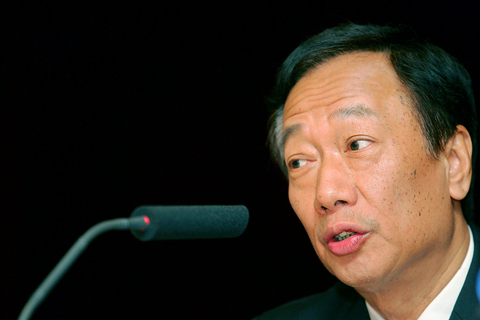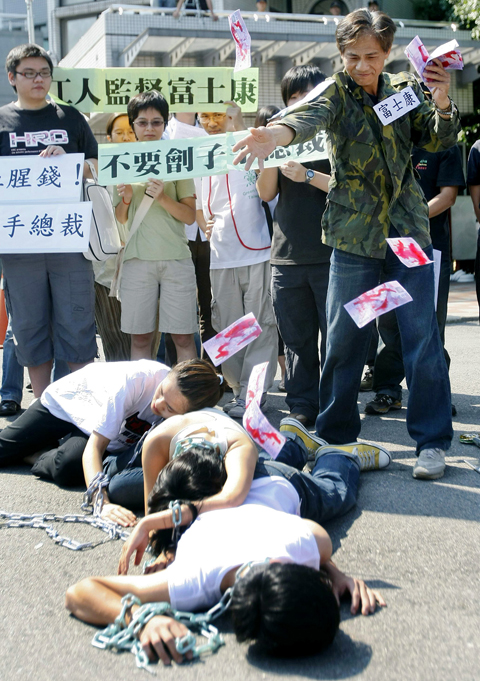Foxconn International Holdings (富士康) said it will seek higher prices from its clients to help offset wage hikes at a plant in southern China that has been hit by a series of suicides.
Meeting shareholders in Hong Kong for the first time since the deaths, executives at Foxconn, owned by Hon Hai Precision Industry Co (鴻海精密), said the company hoped to reach a consensus with customers this month.
At a separate shareholder meeting in Taipei, Hon Hai chairman Terry Gou (郭台銘) said a report he had commissioned showed no clear link between the suicides and work issues.

PHOTO: MAURICE TSAI, BLOOMBERG
“We have to carry the 12 crosses, we have no options,” Gou said, referring to the 10 suicides and two other attempted suicides.
Hon Hai has announced two wage raises in the past two weeks for workers at its Shenzhen plant. Gou said the company would raise wages at all its factories in China, but the pay hikes at the different factories will vary because of differences in the cost of living.
Gou, 59, said the decision to raise salaries proved the company was “not making money by exploiting workers.”

PHOTO: PICHI CHUANG, REUTERS
“The pay hike may have a short-term impact on profits, but it’s good for the long term, because it will attract better and more stable workers,” he said.
Hon Hai has lost more than US$3 billion market value in two days as investors fret over the pay increases.
“I think the pay hike is too much,” said a shareholder surnamed Chen who was attending the Taipei meeting. “I’m concerned this will increase production costs and affect profits.”
Hon Hai will also offer start-up loans of 200,000 yuan (US$29,275) each to employees who have been with the company for more than five years, Gou said.
Workers who apply for and obtain the loans will be able to return to their hometowns, start their own businesses and even place orders with Hon Hai, he said.
But in a sign of changes ahead, Gou said the company was looking for locations to shift some unspecified production from China to automated plants in Taiwan and wanted local authorities in China to manage its worker dormitories.
He also said he would limit overtime at Chinese plants to no more than three hours a day.
A group of about 30 protesters gathered outside Hon Hai’s meeting, including labor activists, green and gay groups and others.
“I think Gou is trying to use salary hikes to cover up how his production line is killing people. It’s a crime in management and we really despise it,” said Huang Hsiao-ling (黃小陵), secretary-general of the Worker Injury Association.
About 30 protesters stood outside the Hong Kong shareholders’ meeting calling on Apple to act on the Foxconn situation.
Holding placards reading “Workers are not machines. They have self-esteem” and a picture of a rotten apple, protesters handed a petition to a company representative.
They also waved a cardboard cutout of chief executive Steve Jobs with devil’s horns and another placard featuring the company logo and the words “Bloody Apple.”
Gou also announced plans to more than double the size of a share issue to fund future expansion for Hon Hai, including into cloud computing and LEDs. He said the firm would issue up to 880 million shares in depositary receipts.
Hon Hai’s shares on the Taiwan Stock Exchange dropped 6.38 percent at one point yesterday, close to the 7 percent maximum allowed, after ending on Monday 5.62 percent lower. The shares closed 5.11 percent lower yesterday at NT$111.5.

TAKING STOCK: A Taiwanese cookware firm in Vietnam urged customers to assess inventory or place orders early so shipments can reach the US while tariffs are paused Taiwanese businesses in Vietnam are exploring alternatives after the White House imposed a 46 percent import duty on Vietnamese goods, following US President Donald Trump’s announcement of “reciprocal” tariffs on the US’ trading partners. Lo Shih-liang (羅世良), chairman of Brico Industry Co (裕茂工業), a Taiwanese company that manufactures cast iron cookware and stove components in Vietnam, said that more than 40 percent of his business was tied to the US market, describing the constant US policy shifts as an emotional roller coaster. “I work during the day and stay up all night watching the news. I’ve been following US news until 3am

Six years ago, LVMH’s billionaire CEO Bernard Arnault and US President Donald Trump cut the blue ribbon on a factory in rural Texas that would make designer handbags for Louis Vuitton, one of the world’s best-known luxury brands. However, since the high-profile opening, the factory has faced a host of problems limiting production, 11 former Louis Vuitton employees said. The site has consistently ranked among the worst-performing for Louis Vuitton globally, “significantly” underperforming other facilities, said three former Louis Vuitton workers and a senior industry source, who cited internal rankings shared with staff. The plant’s problems — which have not

TARIFF CONCERNS: The chipmaker cited global uncertainty from US tariffs and a weakening economic outlook, but said its Singapore expansion remains on track Vanguard International Semiconductor Corp (世界先進), a foundry service provider specializing in producing power management and display driver chips, yesterday withdrew its full-year revenue projection of moderate growth for this year, as escalating US tariff tensions raised uncertainty and concern about a potential economic recession. The Hsinchu-based chipmaker in February said revenues this year would grow mildly from last year based on improving supply chain inventory levels and market demand. At the time, it also anticipated gradual quarter revenue growth. However, the US’ sweeping tariff policy has upended the industry’s supply chains and weakened economic prospects for the world economy, it said. “Now

COLLABORATION: Given Taiwan’s key position in global supply chains, the US firm is discussing strategies with local partners and clients to deal with global uncertainties Advanced Micro Devices Inc (AMD) yesterday said it is meeting with local ecosystem partners, including Taiwan Semiconductor Manufacturing Co (TSMC, 台積電), to discuss strategies, including long-term manufacturing, to navigate uncertainties such as US tariffs, as Taiwan occupies an important position in global supply chains. AMD chief executive officer Lisa Su (蘇姿丰) told reporters that Taiwan is an important part of the chip designer’s ecosystem and she is discussing with partners and customers in Taiwan to forge strong collaborations on different areas during this critical period. AMD has just become the first artificial-intelligence (AI) server chip customer of TSMC to utilize its advanced